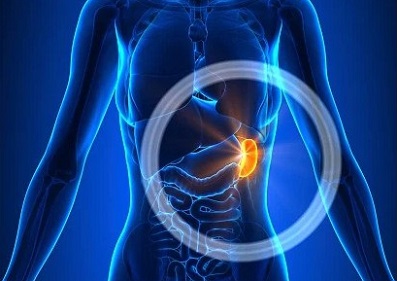COVID-19 News: Researchers Warn That SARS-CoV-2 Infections Can Lead To Splenic Infarctions!
Nikhil Prasad Fact checked by:Thailand Medical News Team Dec 14, 2023 2 years, 4 days, 7 hours, 3 minutes ago
COVID-19 News: The global impact of the COVID-19 pandemic has been staggering, with the World Health Organization classifying it as a pandemic, leading to numerous fatalities and hospital admissions worldwide. While the majority of COVID-19 cases are considered mild, severe cases have been associated with various complications, including respiratory failure, septic shock, and multiple organ dysfunction. One particularly rare and poorly understood complication is splenic infarction, a condition where compromised blood flow to the spleen results in tissue ischemia and necrosis. Recent research has shed light on a potential link between SARS-CoV-2 infections and splenic infarctions, prompting further investigation into the clinical features, prognosis, and underlying mechanisms of this unusual complication.

While many claim that splenic infarctions as a result of SARS-CoV-2 infections are rare, numerous case studies and
COVID-19 News reports show that this is not the case.
https://www.sciencedirect.com/science/article/pii/S2214250921000184
https://casereports.bmj.com/content/14/12/e246274
https://www.sciencedirect.com/science/article/pii/S1930043321000807
https://www.sciencedirect.com/science/article/pii/S2049080121008852
https://karger.com/dmj/article/5/1/74/823292/Splenic-Infarction-in-a-COVID-19-Patient-without
https://www.mdpi.com/2227-9032/10/1/150
https://www.cureus.com/articles/103552-incidental-and-asymptomatic-splenic-infarction-and-infrarenal-thrombus-in-a-covid-19-patient#!/
https://www.hindawi.com/journals/cris/2022/3391405/
Thailand
Medical News would also like to warn that with the spread of the BA.2.86 variant especially the JN.1 sub-lineages, recent incidences of splenic infarctions seems to be rising!
Understanding Splenic Infarctions: Causes and Symptoms
Splenic infarctions can be caused by arterial or venous occlusion, typically resulting from blood clots, septic emboli, or venous congestion by abnormal cells. The common risk factors include blood clots from the heart, blood cancers like lymphoma or leukemia, diseases causing abnormal bloo
d clotting (e.g., sickle cell disease), and inflammation or masses affecting blood vessels around the spleen. The symptoms often manifest as abdominal pain in the left upper quadrant, accompanied by nausea, vomiting, fever, chest pain, and left shoulder pain. While splenic infarctions are generally rare, they can lead to life-threatening complications, including rupture and hemorrhage.
The Emerging Connection Between COVID-19 and Splenic Infarctions
Recent studies conducted at Pamnani Hospital and Research Center-India, Deccan College of Medical Sciences-India, SGT Medical College-India, Mercy Catholic Medical Center-USA, King George Hospital-India, Goa Medical College and Hospital-India, Jinnah Sindh Medical University-Pakistan, and Camden Clark Medical Center/University of West Virginia-USA have reported an intriguing association between COVID-19 and splenic infarctions. Analyzing histopathological reports and clinical data from six adult patients diagnosed with both COVID-19 and splenic infarcts, the research uncovered a direct impact of the virus on the spleen, leading to a decline in lymphocyte counts.
Case Series Analysis
The retrospective case series investigated six individuals admitted to a tertiary care center between October 2020 and January 2021. All patients had confirmed COVID-19 diagnoses through nasopharyngeal swabs or CT scans, and splenic infarcts were confirmed through abdominal CT scans. The cases presented diverse clinical characteristics and outcomes:
-A 35-year-old male with splenic laceration, requiring packed red blood cell transfusions and symptomatic management.
-A 67-year-old male with 70% splenic infarction due to a thrombus, treated with enoxaparin and later switched to oral rivaroxaban.
-A 29-year-old female with sickle cell trait exhibiting diffuse ground glass opacity in both lungs, splenic hypodensity, and peri-splenic edema, treated with hydroxychloroquine, tocilizumab, and continuous heparin infusion.
-A 58-year-old male with dyslipidemia presenting with impaired blood flow in relevant arteries, treated with hydroxychloroquine, azithromycin, anakinra, and low-molecular-weight heparin.
-A 57-year-old male with type 2 diabetes mellitus presenting with intra-aortic thrombi, splenic and renal ischemic lesions, treated with hydroxychloroquine, antibiotics, low-molecular-weight heparin, tocilizumab, and oxygen therapy.
-A 70-year-old male with a non-enhancing area in the spleen and a large hematoma within the rectus sheath, treated with enoxaparin, dexamethasone, remdesivir, and radiology embolization.
Discussion and Implications
The documented cases underscore the diverse nature of splenic infarctions in COVID-19 patients, emphasizing the need for a multidisciplinary management approach and heightened awareness among healthcare providers. The findings suggest a direct impact of COVID-19 on the spleen, as evidenced by lymphocyte count decline, emphasizing the significance of understanding potential complications associated with the virus.
The review of existing literature further highlights the association between COVID-19 and an increased risk of thromboembolism, emphasizing the importance of monitoring and managing clotting issues in affected patients. The literature also underscores the need to consider splenic infarction as a potential complication in COVID-19 patients presenting with abdominal pain.
Conclusion and Future Directions
In conclusion, the emerging link between COVID-19 and splenic infarctions adds another layer of complexity to our understanding of the varied manifestations of this viral infection. Recognizing splenic infarction as a potential complication is crucial for healthcare providers, particularly when evaluating patients with abdominal pain and a history of or concurrent COVID-19 infection.
Further research is warranted to elucidate the underlying mechanisms of splenic infarctions in the context of COVID-19 and optimize treatment strategies. Future studies should focus on uncovering precise pathophysiological mechanisms, exploring the interaction between the SARS-CoV-2 virus and the coagulation system within the spleen, and refining diagnostic approaches for splenic infarctions in COVID-19 patients.
As the world continues to grapple with the ongoing challenges posed by the COVID-19 pandemic, a comprehensive understanding of its diverse complications is essential for effective management and improved patient outcomes.
The study findings were published in the peer reviewed journal: Le Infezioni in Medicina.
https://www.infezmed.it/media/journal/Vol_31_4_2023_15.pdf
For the latest
COVID-19 News, keep on logging to Thailand Medical News.
